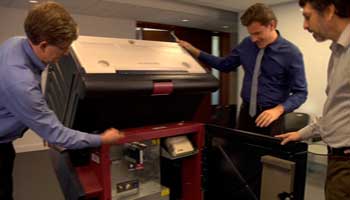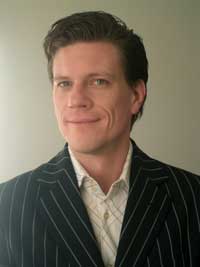It's pretty safe to assume that wherever a voter in the upcoming election falls on the Red-to-Blue political spectrum, that person may be a little wary of the efficacy of America's voting system. The images of the chaos of the hanging chads in 2000 has imbedded a memory bug that may last for generations.

A story on Friday's Need to Know on PBS (8:30 ET, check local listings) might give that suspicion bug additional shelf life...
Ballot Boxing is a segment by correspondent Rick Karr that shows that some of the $3 billion dollars of federal money that was supposed to correct voting problems created new ones. Congress voted the money in the Help America Vote Act and President Bush signed the bill in 2002. A decade after the disputed Florida election that went all the way to the Supreme Court, Karr has discovered that about 50 million people can vote Tuesday only on high-tech machines that, in theory, were purchased to solve those problems -- but, in fact, are rather easily hacked in a way that can illegally steer election results in ways that defy detection.
Karr interviews Princeton University computer scientists who demonstrate how relatively easy it is to capture and change voting machine results with just just a minimum of computer skills. A substitute chip or a card can be placed in a voting machine that has no paper record, a program on that device can alter data to a desired result, and the crime can't be traced.

Machines vulnerable to this kind of manipulation are the only way citizens of six states (Delaware, Maryland, New Jersey, South Carolina, Georgia and Louisiana) can vote with this year, Karr said. His report shows two obstacles to correcting the problem: In almost all cases, there is no money to repair or replace the machines; and election officials who "staked their reputations" on the quality of the voting machines in question aren't anxious to admit a mistake.
Because this kind of voting fraud is so difficult to trace, it's unknown, he said, whether it has been used before.
"But there are some people who suspect it has been done," Karr said.
States that adopted lower-tech voting reforms, ones in which a much clearer paper trail is left, aren't similarly vulnerable to electronic fraud, he said; about 100 million voters have access to this new "gold standard" for voting, he reports.

Karr began following this story in 2002 and has kept up with its developments. He said this year's election, a decade after the one that caused so many reforms, was a good time to update the story for the public. Companies that make voting machines and state officials who oversee voting weren't very cooperative, Karr said. The easier side of the story was getting to the academics who demonstrate the flaws in the voting machines.
"They do not have any dog in this fight," he said. "They just hate poorly designed computer hardware."